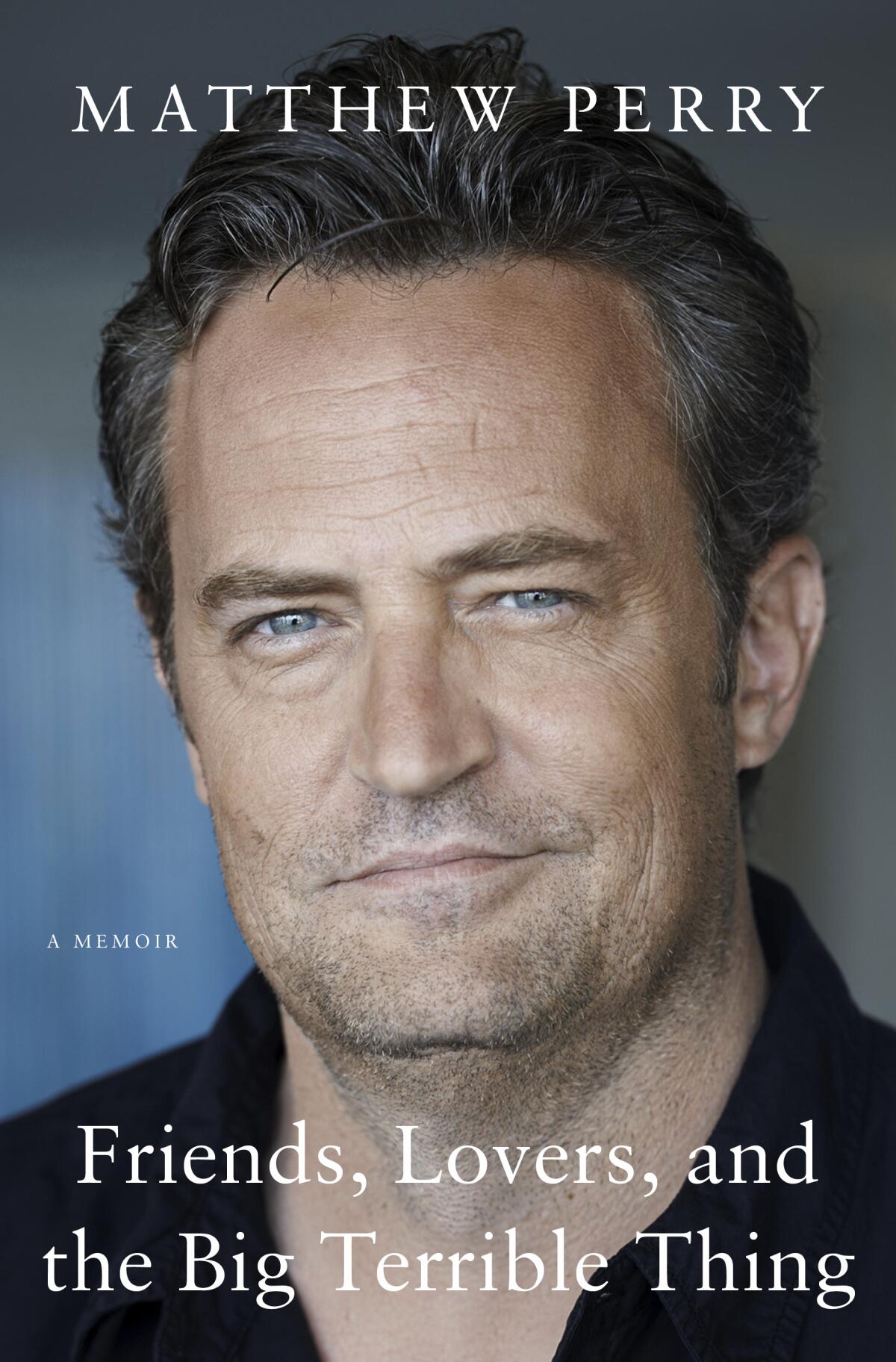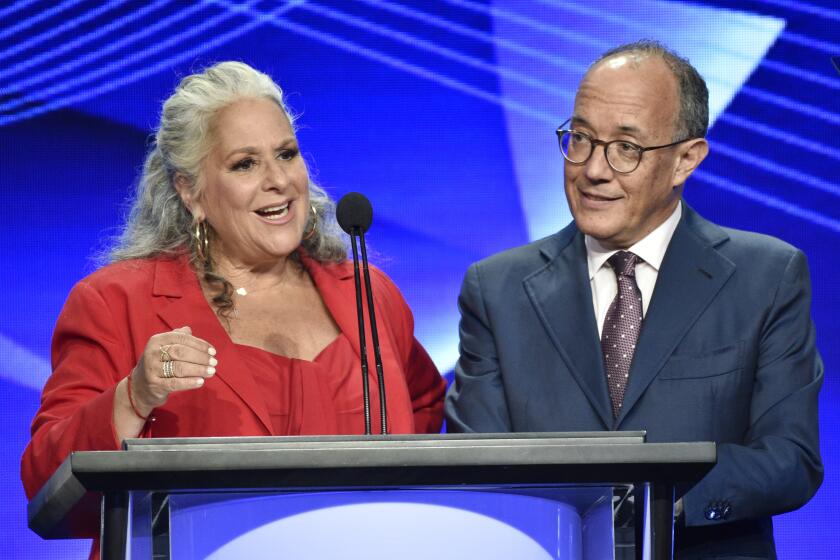Matthew Perry starred in a hit show. But for those fighting addiction, his greatest legacy is his memoir

Matthew Perry may be widely remembered for his role as the sweetly acerbic Chandler Bing on “Friends,” but for the millions of Americans who have struggled with addiction and sought recovery, the actor’s 2022 memoir might be his most impactful work.
Perry’s memoir, “Friends, Lovers, and the Big Terrible Thing,” published to great acclaim last fall, recounted his decades-long struggles with substances and his herculean recovery efforts. Within hours of Perry’s death Saturday at age 54, readers flooded social media with tributes about the brave and forthright nature of his book. Among the revelations: Perry estimated that he had spent more than $7 million over 15 rehab stays treating his addictions to alcohol and drugs, including opioids.

His memoir was an uncommonly candid, bracing look at how addiction can devastate even beloved cultural figures at the height of their fame. But it also emphasized how Perry found continued hope to push his recovery work forward through the very end.
“His life showed the worst of this illness and the best hopes for our ability to overcome it,” said William C. Moyers, vice president of public affairs for Hazelden Betty Ford, the national addiction treatment center with facilities in Rancho Mirage and Los Angeles.
Moyers said he’d met Perry through the actor’s recovery advocacy and had praised him for his fearlessness in writing the book and in speaking so frankly about his struggles.
”His willingness to share his story so publicly captured the reality that hope is real,” Moyers said. “Regardless of what his cause of death is, he kept fighting and fell and got back up, and was never ashamed to share that truth.”
The federal Substance Abuse and Mental Health Services Administration estimates that 16.5% of Americans over age 12 live with a substance abuse disorder and that 9.2 million Americans over age 12 misused opioids in 2021.
For those in or seeking treatment, the last three years have been especially trying, and stories of recovery have been crucial.
Amid the outpouring of grief from “Friends” castmates and fans, world leaders and others, many in addiction treatment said Perry’s death was a deep loss. They empathized with his commitment to keep seeking treatment even after setbacks in his recovery.
“Yes, he was Chandler,” actor Eric Lange wrote on X. “But, I hope what Matthew Perry will be remembered for most is that he used his platform to openly share his struggles with the world in the hopes it might help others. It helped me.”
Another memoir reader wrote on the platform formerly known as Twitter: “As a person in active recovery this stings. His book was the first one I read this year and proof that having endless resources are never a cure for addiction.”
“Friends” co-creators Marta Kauffman and David Crane, along with the show’s executive producer Kevin Bright, shared a joint statement about the death of Matthew Perry.
And still another person wrote: “Went through a super low point where I regretfully thought long and hard about picking up late last year, didn’t thank heavens, and Matthew Perry’s recent memoir helped keep me sober. To say I’m gutted is an understatement.”
Even pop singer Adele paused her Las Vegas concert Saturday to share what Perry’s vulnerability about addiction had meant to her.
“He was so open with his struggles with addiction and sobriety, which I think is incredibly, incredibly brave,” she said onstage.
Perry shared painful details in his book, recounting his arc from “Friends” ultra-stardom in the ’90s to a period in 2019 where, in large part because of his drug use, he spent two weeks in a coma with an exploded colon and endured a dozen stomach surgeries.
Even after one his proudest moments onscreen, he wrote, “I married Monica and got driven back to the treatment center — at the height of my highest point in ‘Friends,’ the highest point in my career, the iconic moment on the iconic show — in a pickup truck helmed by a sober technician.”
As recently as 2020, he wrote, after doctors administered propofol that interacted dangerously with hydrocodone already in his bloodstream, paramedics broke eight ribs administering CPR to save his life.
“The kind of message that I guess I give out with this book is don’t give up,” Perry said in an interview last November. “There’s help out there. I’ve been helped on a daily basis. If I didn’t get help, I wouldn’t be sitting here.”
“A lot of us struggle in secret for a long time. We know we have a problem but we think it’s unique,” said Mary Reid, executive director of Moderation Management, a secular AA-style program for people who want to reduce their substance use. “To me, it was such a relief to hear other stories and realize I wasn’t alone, that others had the same doubts. It sounds like [Perry] was pretty honest about his ups and downs, and to have someone come forward with that candor, you can see that no one is immune, and that opens up doors.”
For many fans, the cause of Perry’s death ultimately may not actually matter when it’s determined. (Responding officers found no illicit drugs at the Pacific Palisades home where Perry died; a toxicology report is pending, and prescription medications recovered at the home will be part of the investigation, which is common practice.) At the time of the book’s release, Perry said he’d been 18 months sober.
“I listened to his memoir last year, and it was so heartbreaking to hear him struggle so often,” said Eileen Powers-Twichell, who facilitates Moderation Management meetings in the Boston area and emphasized that Perry’s resilience is inspiration for people who think that once they slip up, they should just give up. “He had the ability to go on and kept getting back up.”
The ‘Friends’ actor, who died Saturday at 54, was a ninja of sarcasm — and his peerless blend of resilience and vulnerability made him a star we could all root for.
Perry’s book earned comparisons to searing, intimate addiction memoirs by writers like David Carr and Leslie Jamison. Yet celebrity addiction memoirs can be a double-edged sword when it comes to inspiring recovery efforts, Moyers said. The resources that wealthy people can put toward sobriety are vast compared to what typical working people have to get effective care.
“There’s always a risk in having famous people share struggles with addiction, because most of us don’t live in that rare air,” Moyers said. “But all of us can relate to the struggles families have, and we know this illness that does not discriminate whether you’re Matthew Perry or a homeless person seeking treatment at the Salvation Army. We all relate to the brutality of this illness, and that like the rest of us, he kept picking himself up, and he was a better man for it.”
Readers of Perry’s memoir know that he barely avoided death on many occasions, as his illness proved formidable even after years of recovery work.
“People might look at his story and say, ‘He didn’t try hard enough,’” Reid said. “But he never gave up. Once you start trying to change, it’s a continual journey, and relapse is a common part of that process. You can learn from that. He made his life richer through recovery, and he probably saved lives with what he shared.”
The book’s lessons in resilience and community support, and the example Perry set in his recovery and bravery in documenting it, should still hold true regardless of the circumstances of his death, Moyers said.
“Betty Ford told me back in the ’90s that the most important reason we tell these stories is to reach other people,” Moyers said. “Matthew Perry told that story. We should celebrate that he had the life he did for 54 years, because he never gave up. This illness strips us of hope, but reading how supportive his colleagues were, and how he wouldn’t have made it if not for his friends and family, we should find great meaning in that and never give up on our loved ones.”
Authorities found Perry unresponsive in his Los Angeles home Saturday. There was no sign of foul play.
Times staff writer Jen Yamato contributed to this report.
More to Read
Updates
4:17 p.m. Oct. 30, 2023: This article has been updated with additional sources working in the field of addiction and recovery.
The biggest entertainment stories
Get our big stories about Hollywood, film, television, music, arts, culture and more right in your inbox as soon as they publish.
You may occasionally receive promotional content from the Los Angeles Times.














